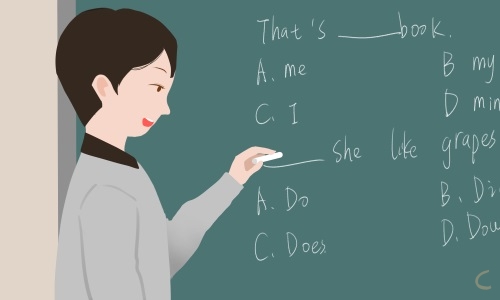虽然在学习的过程中会遇到很多不愉快的事情,但古人说得好——吃一刀,长出智慧。多一次失败,多一次教训;多一次挫折,多一次经历。没有失败和挫折的人永远不会成功。下面是小编为大家整理的有关英语期末复习资料归纳初三,希望对你们有帮助!

英语期末复习资料归纳初三1
1.There be 结构
a.这是英语中常见的一种结构,表示“某地有某物”其含义为“存在有”。
eg.There are twenty girls in our class.have也解释为“有”但是与there be有区别,它的含义是“所有,属有”,其主语为某人。eg.I have a nice watch.
b.There be 结构中的be动词要和后面所跟名词保持一致。
c.There is a river near our school.否:There is not a river near our school.
问:Is there a river near our school.回答:Yes, there is. No, there isn't.
划⑴How many rivers are there near our school?⑵What's near our school?
d.there be 结构的一般将来时,同学们较难掌握,其正确形式为:there is going to be
e.反意疑问句的构成:There is no water in the glass, is there?
①There is going to _____ a football match this afternoon. A.haveB.watchC.beD.play
②They were sure that they were going to ____ a rest.A.beB.haveC.be onD.on
2.so,neither引导的倒装句,为了避免和前一句话的内容重复,英语中习惯用so,neither引导的倒装句。
a.So+be(助动词,情态动词)+主语。表示某人也是如此。
eg.Mike has bought some foreign stamps. So has Bob.=Bob has bought some,too.
b.Neither+be(助动词,情态动词)+主语,表示某人也不。
eg.Mother has never been to Japan. Neither has Father.=Father has never been to Japan, either.
c.So+主语+be(助动词,情态动词)。表示果真如此(赞同), 请同学们与a.区别。
eg.A:Mike is right in the classroom. B:So he is.=He is really in the class room.
3.It's+时间+since动词过去式。自从...起已有...时间了。
⑴It's two weeks since we met last.(自从我们上次见面已有两个星期了)
⑵How long is it since we left Beijing?(自从我们离开北京已有多久了
4.祈使句+and (那么)...eg.Go straight on and you'll see a school.=If you go straight on, you'll see a school.
5.祈使句+or...否则...eg.Work hard, or you will fall behind the other students.=If you don't work hard, you'll fall behind the other
6. The+比较级...,the+比较级... 越...越...
eg.⑴The more, the better. 越多越好。
⑵The harder you work on it, the better you'll be at it.(你越用功,你就越好。)
7.How do you like the film? =What do you think of the film? (你认为这部电影怎样?)
8.What...do with...?怎样对付...?怎样处理...?
虽然中文为怎样,我们绝不可照字面翻译为how.
eg.A:What have you done with the library book? B:I've just returned it to the library.
9.I don't know what to do.我不知道该怎么办?I don't know how to do. ×
10.What...be like?...是什么样的?
eg.⑴What's the weather like? 天气如何?⑵What's your school like? 你们学校是什么样的?
11.What...for?为何目的?为什么?
eg.What do you want a science lab for?=Why do you want a science lab?
12.one of +级+复数 最...之一
eg.Miss Zhao is one of the most popular teachers.
13.find it +形容词+to do
eg.I find it useful to learn English well. (我发觉学好英语是很有用的)
find +宾语 +名词eg.I find him a good boy. (我发现他是个好男孩.)
find +宾语 +形容词
eg.I find the door open/closed. (我发现门开/关着) I find our bags filled with/full of presents. (我发现我们的包装满了礼物)
14.I don't think+肯定句 我想...不eg.I don't think I'll take it. (我想我不买它了)
请注意:中文意思否定在从句中,但是英语的表达否定在主句中。
15.prefer A to B=like A better than B 更喜欢A不怎么喜欢B.
eg. I prefer fish to chicken.= I like fish better than chicken
16.had better do sth.干某事.否定:had better not do sth.
特别注意:had better后面跟be动词词组,不可漏掉be.eg.You'd better catch a train.
You'd better not talk in class.You'd better not be late for the class.
17.It is good (nice)of+宾格+to do sth.
eg.It is very good of you to teach me English. (你教我英语真是太好了)
18.It takes sb. some time to do sth.(干某事化费某人多少时间)
=sb.spend some time on sth. (in) doing sth.eg.It took me half an hour to do the work.
=I spent half anhourin doing the work.
19.sb.pay 钱 for 物 某物化费了某人多少钱=sb.spend 钱 on 物 =物 cost sb.钱 , pay的过去式为paid 而不是payed.eg.I paid thirty yuan for the coat. =I spent thirty yuan on the coat.
=The coat cost me thirty yuan. 20.have been to 某人曾去过某地,现在人不在那儿
sb.have been in +地点 某人呆在某地(一段时间) have gone to 某人已去某地,人不在这儿
21.⑴ too…形容词(副词)+to…"太…而不能" "太…以致于不"
eg.①The basket is too heavy for me to carry. 这篮子太重我拿不动。②This colour TV is too expensive for us to buy. 这台彩电对我们来说太贵了,买不起。
⑵so...that 如此...以致于...上面的too...to结构的句子,可以换成so...that 引导的句子转换。①The basket is so heavy that I can't carry it. ②This colour TV is so expensive that we can't afford it.
22.What's the population of ...? ...人口有多少? 不说How much population in...?形容人口数量的大用large eg.The population of China is ten times as large as that of the USA
23.I've come to return your pan. (我跑来是还你锅的) →Why have you come? 而不用What
24.not...until (连词)方才,才
eg.He says that he won't be free until tomorrow.他说他需到明天方才有空。 肯定句+until 到
eg.You'd better wait until tomorrow. (你等到明天)
25.neither...nor... 既不...也不...either...or... 或者...或者...
eg.Neither Tom nor his brothers know how to spell the word "hundred".
Either you or she is right. (谓语动词就近原则)
both...and... 两者都... eg.Both Jim and I are in Grade One (主语看作复数)
Have 的两种特殊句型
have是英语中最活跃的动词之一,它与不同的词搭配表示不同的意思。如:have a meeting(开会),have a rest(休息),have a class(上课)等。你可知道have构成的两种特殊句型吗?不看不知道,一看就明了。
1.have+宾语+省略to的动词不定式
该句型中作主语的“人或物”让作宾语的“人或物”去做某事。此时的宾语与省略to的不定式(宾语补足语)之间有逻辑上的主谓关系。如:I would have you buy a new bike. 我想让你买辆新自行车。We can't have the car stop. 我们无法让汽车停下来。
2.have+宾语+过去分词
该句型中作主语的“人或物”让作宾语的“人或物”被……。此时的宾语与过去分词(宾语补足语)之间有逻辑上的动宾关系。如: I'll have my hair cut tomorrow.
我明天要理发。They have just had their car repaired.他们刚找人把车修理了一下。
注意:大多数情况下,这两种句型之间可以互换。如:
1)He had me wash the table cloth.→He had the table cloth washed.
2) The man had the bike mended.→ The man had someone mend the bike.
练习:根据汉语意思,完成英语句子,每空一词。
1.你应该找人建一座房子。
You should have someone_____a house. You should have a house_____.
2.现在我们请下一位演讲者到前面来。 Now we'll have the next speaker_____to the front.
3.你必须让人把这些书送到教室去。
You must have these books_____ to the classroom
英语期末复习资料归纳初三2
一、大纲要求
词汇
neither, boat, especially, travel, discover, wonderful, population, dumpling, brave, spring, whenever, awake, umbrella, noon, goodbye, cow, cost, baby, holiday
重点句型
Have you ever been to an amusement park?
This means that you can find Disney characters all over the roller coaster.
Tell me about yourself.
So do I.
二、重点解析
单词
1. population
(1) population 是集体名词,它作主语时,若指一个地区或国家的整体人口时谓语动词通常用单数;若强调整体人口中的成员时,谓语动词通常用复数。
eg:
The population of Nanjing is smaller than that of Shanghai. 南京的人口比上海少。
About two fifths of the population here are farmers. 这儿大约2/5的人口是农民。
(2) 在询问人口时,注意population和people的区别,前者用what来提问,后者用how many 来提问。
eg:
What’s the population of Hebei Province? 河北省的人口是多少?
How many people are there in Hebei Province? 河北省有多少人?
(3) 表达人口多少时要用large和small来修饰,不能用many, more和few修饰。
eg:
China has a larger population than Japan. 中国的人口比日本多。
2. neither
(1) neither常用作代词,意为“两者都不”。
eg:
Neither of us can understand. 我们俩谁也不能理解。
Neither was very interesting. 两者都没有多大意思。
(2) 它还可用作形容词,意为“(两者)都不”,常在句中作定语。
eg:
Neither answer is correct. 两个答案都不对。
[注]neither作主语时,应看作是单数形式;neither所修饰的名词也应用单数形式。
(3) neither 用在倒装句中表示“前者所说的内容也适合于后者”,意为“也不”。
eg:
He doesn’t like Beethoven and neither do I. 他不喜欢贝多芬的作品,我也不喜欢。
词语辨析
neither, none, either, both & all
表示肯定意义
表示否定意义
表示两个人或事物
both
neither
表示三个或三个以上的人或事物
all
none
both意为“两者都”;either意为“两者中的任何一个”;neither表示“两者中任何一个也不”。none意为“三个或三个以上一个也不”,all指“三个或三个以上都……”。
(1) 用作形容词时,neither, either修饰单数名词,both修饰复数名词,all可以修饰复数名词,也可以指不可数名词。 eg:
Neither story is true. 两个故事都不真实。
You may take either road. 你可以走两条路中的任何一条。
Both pens are red. 两支钢笔都是红色的。
All the water was poured. 所有的水都泼出去了。
(2) 用作代词时,neither/either常被看作单数,而both应看作是复数;all根据不同的情况可以看作是单数或复数。eg:
Neither is mine. 两个都不是我的。
Both of us are teachers. 我们两个都是老师。
All of us are here. 我们所有的人都在这儿。
(3) neither/none表示完全否定;而both/all和否定词not连用时,表示的是不完全否定意义。
eg: Neither of you is right. 你们两个都不对。
Both of you are not right. 你们两个并非都对。
重点句型
1. Have you ever been to an amusement park? 你曾经去过游乐园?
have been to 意为“去过某地”。 have gone to 指“去了某地,但未回来”。 eg:
She has never been to Beijing. 她从来没去过北京。
—Where is your deskmate? 你同桌去哪儿了?
—He has gone to the bookshop?他去书店了。
2. This means that you can find Disney characters all over the roller coaster.
这意味着在所有的过山车里你都能够看到迪斯尼人物。
mean是及物动词,意为“意思是……,意味着……”。 eg:
What does the word “argue” mean? “argue” 这个单词意思是什么?
It means that he won’t come again. 这意味着他再也不会回来了。
[注]mean的名词形式为meaning. eg:
What’s the meaning of life? 生命的意义是什么?
3. Tell me about yourself. 给我讲讲你的情况。
动词tell的用法:
(1) tell sb. about sb. /sth. 意为“告诉某人有关某人/某事”。 eg:
Could you tell me about your work?你能告诉我你的工作情况吗?
(2) 后接单宾语,意为“讲述、说、告诉”,该宾语通常是事物。 eg:
My mother like telling jokes.我妈妈喜欢讲笑话。
(3) 后接双宾语,即人和事物,表示“讲述、说、告诉”。eg:
She has told me the thing.她已经告诉我这件事了。
(4) tell sb. (not) to do sth. 意为“吩咐/命令某人(不)做某事”。 eg:
Tell him to wait. 叫他等一等。
(5) 它常与can, could, be able to 连用,意为“辨别,分辨”。 eg:
I can’t tell Tom from his twin brother?我不能分辨出汤姆和他的孪生兄弟。
4. So do I. 我也是。
“So+助动词/情态动词+主语”是倒装句结构,用于后一句陈述内容与前一句陈述内容相同,且前后的主语是不同的人,意为“某某也如此”。若前后陈述的情况为否定式,用 Neither或Nor来替代So。 eg:
—I am a teacher.我是一名老师。
—So is he.他也是。
—She can’t dance. 她不会跳舞。
—Nor can I. 我也不会。
[注] 若前后两陈述句的主语一致,且陈述内容相同,则用So+主语+助动词/情态动词,意为“某某的确如此”。 eg:
—He is very brave.他很勇敢。
—So he is.的确如此。
5. I was having a hard time finding it until you came along.
我一直很难找到它,直到你走了过来。
have a good time doing sth. 意为“做某事很费劲”。eg:
The police had a hard time finding the lost child. 警察好不容易找到了这个走失的孩子。
6. I didn’t know some of the girls, but they were all really friendly to me.
有些女孩子我不认识,但她们真的对我很友好。
be friendly to sb. 意为“对某人很友好”。eg:
My classmates are friendly to me. 我的同学对我很友好。
英语期末复习资料归纳初三相关文章:
★ 初三英语复习期末复习资料大全
★ 中考英语重点知识复习资料汇总
★ 九年级下册英语知识点总结
★ 2020年九年级英语复习计划四篇范文
★ 七年级上册英语期末复习资料2021
★ 九年级英语工作总结五篇
★ 2020年中考英语句型知识点汇总
★ 小学英语期末重点复习资料2021
★ 初三英语复习课教学反思
★ 最新初三数学期末复习资料2021









 扫一扫支付
扫一扫支付


